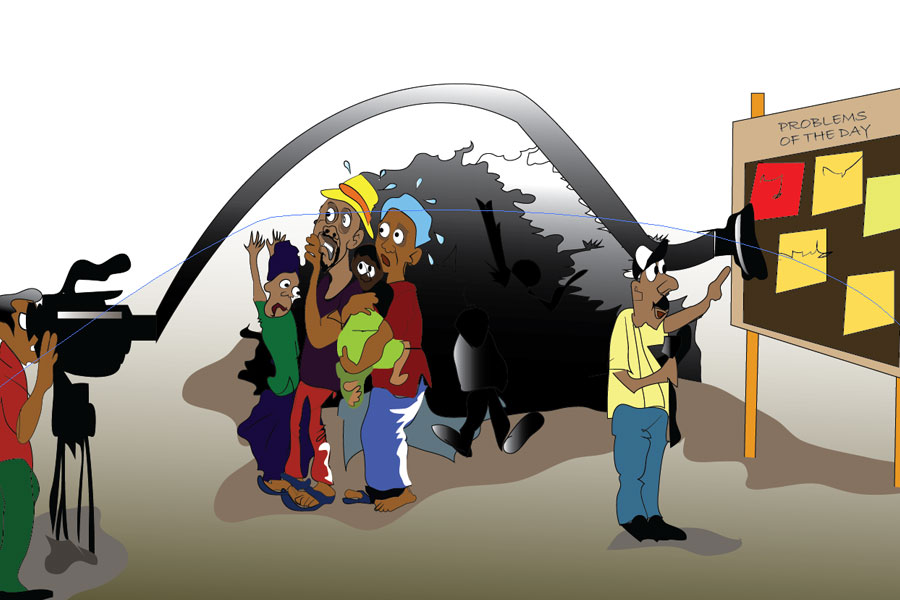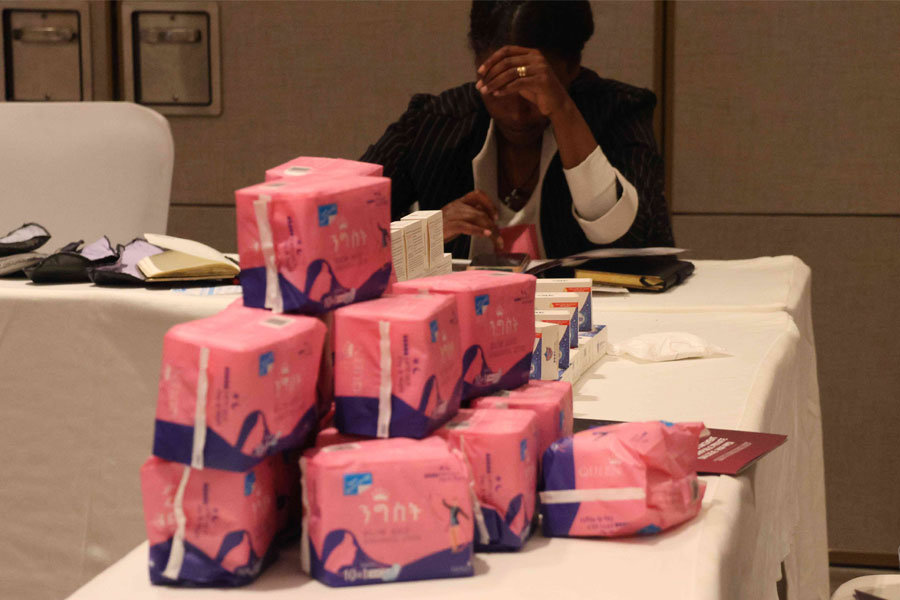
Apr 17 , 2020
By Sehin Teferra (PhD) ( Sehin Teferra (PhD) is the founder of Setaweet Movement. She can be reached at sehin.teferra@setaweet.com. )
It has been over three months since a then-unnamed respiratory illness appeared in China’s Hubei province. It has since spread rapidly to all corners of the world, global cases have reached millions, and hundreds of thousands have died.
The Novel Coronavirus (COVID-19) came to Ethiopia relatively late. The nation, not accounting for gaps in the availability of testing and reporting, already has dozens of confirmed cases and three fatalities.
Women contract the virus in fewer numbers than men do. However, the fallout from the crisis will be much deeper than who gets sick and who dies. The particular nature of the pandemic, in devastating economies and requiring people to stay home to avoid infection, impacts women and men differently and deepens existing inequalities.
In a country as poor as ours, the concern of a majority of our citizens is accessing their next meal, and food is a particularly gendered issue. With the closing of regional borders, we can expect food prices to rise, impacting women’s access to nutrition for their families.
Urban mothers who have come to rely on their children being fed at school now have to find alternative sources of nourishment for their children, on incomes that have most probably been compromised.
Water is another significant issue that highly impacts women. In rural Ethiopia in particular, and sometimes in many urban areas, fetching water is the job of young women. The need for family members to wash their hands consistently to protect themselves from infection, and to keep homes and establishments clean adds weight to the burden of women.
Women comprise the majority of the care economy - they take care of elderly parents and relatives, are nannies to other peoples' children and work as servers and cleaners in our buildings and establishments. Women who take care of mentally ill family members or children with disabilities are particularly impacted by decreased transport opportunities and access to health care.
Over two-thirds of medical workers in the world are women serving as doctors, nurses, cleaners and support staff, according to the World Health Organization (WHO), and our current crisis in accessing protective clothing and gear while caring for infected individuals affects them disproportionately.
Women are already paid less than men for equivalent work on the construction sites of urban centres and throughout our service industry. As factories, beauty salons and hotels close for the duration of the crisis, we can expect the impact to hit women harder. Women are also a majority of the workers in the informal sector in Ethiopia, making their daily bread by selling vegetables, trading small goods on roadsides or working in the sex industry.
Women are the majority of the people who sweep our streets, clean buildings and homes and many work as temelalash, on a temporary basis, with little job security. As they stay home to avoid infection, many of these women will be told to not return, losing valuable income that will not be easily replaced.
A recent article in The Atlantic referred to the COVID-19 crisis as "a disaster for feminism." In just over three months, we have witnessed women all over the world lose their hard-won gains toward equality in the home and at the workplace. Professional women in Ethiopia, a small proportion of the population, now have to combine work with their new status as home-school teachers with insufficient practice and expertise.
The pandemic has tested countries with far better resources than ours. A surge in cases will pose great difficulties not only for treating patients but also for people who depend on our extensive network of health centres and referral hospitals in the treatment of chronic illnesses and for emergency cases.
Women will continue to get pregnant and give birth during the crisis, and the diversion of resources to fighting the virus will cost us dearly. Blood banks are already reporting a shortage, and women who give birth at health facilities might not receive life-saving transfusions.
Road blockages and curfews affect pregnant women in particularly dangerous ways. We have seen a strain on maternal health services caused by the crisis in other African countries. In Uganda, for example, women have reportedly died en route to health centres.
All indications also show that violence against women and children rises during crises. Countries which have better data collection systems have reported a sharp rise in reports of sexual and physical abuse during the pandemic. In South Africa, 87,000 calls were placed to domestic violence hotlines on the sixth day of lockdown, and in other countries the numbers of reported cases has doubled or tripled.
Ethiopia’s government has been late in implementing measures against the pandemic, but it is doing its best to make up for lost time. If all actors adopt a gender lens now, it will help us avoid disaster later.
The handling of the quarantine facilities where travellers and returnees to Ethiopia have been kept under surveillance serves as a snapshot of the need to include gender in all efforts to contain the spread of the virus. Where women are kept inside for fourteen days at a time, it is essential that menstrual hygiene products be made available, in addition to a separate room for breastfeeding mothers and their infants. A percentage of the women entering quarantine will be pregnant, and there needs to be a system whereby they can access medical care if they should require it.
There are encouraging trends. Chief Justice Meaza Ashenafi, president of the Supreme Court, announced on Thursday morning that the courts will hear domestic violence cases as a priority area that will not be affected by the closure of most courts, a huge pre-emptive move against the surge in violence that we can expect.
Deputy Mayor Takele Uma has called for property owners to waive rents during the crisis period and many renters have responded positively, a great support for many poor women and men who may not be able to afford to pay monthly rent with their reduced incomes.
Also in the works is a discussion about utilising Ethiopia’s highly-touted, all-women frontline health care workers to combat the spread of the virus at the community level. These women are largely under-compensated, and any measures to deploy these women to the frontlines of this blazing crisis needs to ensure that they have full protective wear as they work to share information and make testing available for the virus in rural areas.
Although the lion’s share of the work will fall on the capable shoulders of the government, we must all do our part to address the gender angles of the pandemic. Marie Stopes clinics have remarkably made their services in Addis Abeba accessible during this period, not only by keeping their clinics open but also offering free transportation for women and girls who may not be able to come to the clinics because of reduced transportation options.
Women-run pharmaceutical companies are producing sanitizer for the market and as donations, and women are leading the collection and distribution of food and dry goods in the poor neighbourhoods of Addis Abeba.
In terms of gender-based violence, the three one-stop-centres that serve Addis Abeba - Tirunesh Beijing, Gandhi and Menelik hospitals - have remained open but have seen a decrease in reported cases of sexual violence. This is perhaps because women and girls fear going to health centres during a raging health crisis, or perhaps because they live with the people who have caused them harm and they do not have the privacy to report abuse. Nonprofit organisations focusing on women’s rights should thus work with partners such as Ethio telecom to move services online so that calls can be rerouted to counsellors in the safety of their homes as Setaweet[of which the author of this articles is a founder] has done.
With the pandemic having arrived relatively late in Ethiopia, we have the opportunity to learn from other countries that have progressed in their fight to mitigate the damage that the crisis can cause in the long term.
In neighbouring Kenya, factories are turning into surgical mask assembly lines, and there is the potential for privately-owned Ethiopian companies to utilise their female labour in a similar manner. We can choose to learn from this global affliction and emerge, once the crisis passes, stronger in our commitments to an equal and resilient Ethiopia.
PUBLISHED ON
Apr 17,2020 [ VOL
21 , NO
1042]

Commentaries | Jul 18,2020

Editorial | Jan 18,2019

Viewpoints | Apr 19,2025

Radar | Jan 23,2021

Commentaries | Jun 13,2020

Viewpoints | Apr 19,2025

Agenda | Jun 08,2025

Commentaries | Jun 08,2019

Commentaries | Jul 10,2021

My Opinion | Nov 04,2023

Dec 22 , 2024 . By TIZITA SHEWAFERAW
Charged with transforming colossal state-owned enterprises into modern and competitiv...

Aug 18 , 2024 . By AKSAH ITALO
Although predictable Yonas Zerihun's job in the ride-hailing service is not immune to...

Jul 28 , 2024 . By TIZITA SHEWAFERAW
Unhabitual, perhaps too many, Samuel Gebreyohannes, 38, used to occasionally enjoy a couple of beers at breakfast. However, he recently swit...

Jul 13 , 2024 . By AKSAH ITALO
Investors who rely on tractors, trucks, and field vehicles for commuting, transporting commodities, and f...

Jul 12 , 2025
Political leaders and their policy advisors often promise great leaps forward, yet th...

Jul 5 , 2025
Six years ago, Ethiopia was the darling of international liberal commentators. A year...

Jun 28 , 2025
Meseret Damtie, the assertive auditor general, has never been shy about naming names...

Jun 21 , 2025
A well-worn adage says, “Budget is not destiny, but it is direction.” Examining t...